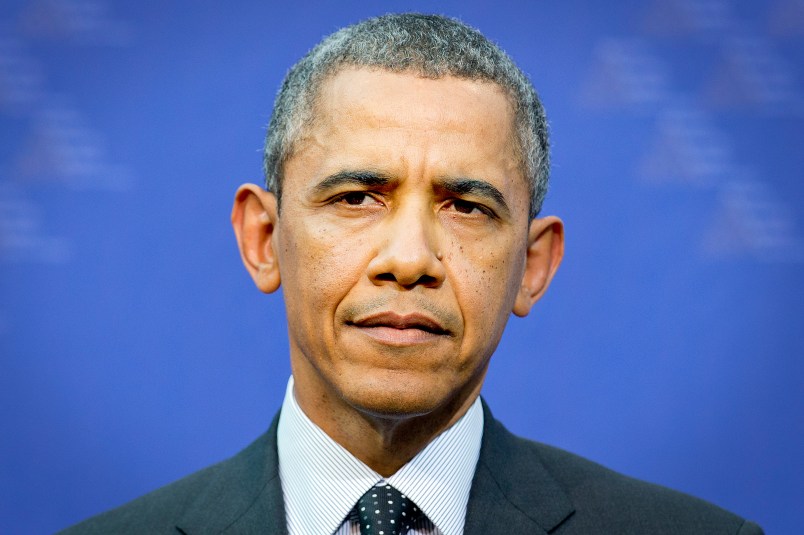A few street blocks away from Supreme Court oral arguments Tuesday on the contraceptive mandate, an appeals court heard a separate case that poses a far greater threat to Obamacare and could cripple the law.
And while many have considered it a long shot, it showed clear signs of life.
The case is about whether the Affordable Care Act permits the federally-run insurance exchange to provide subsidies to consumers. Crafted by Case Western law professor Jonathan Adler and Cato’s Michael Cannon, it charges that the plain language of the statute confines the provision of premium tax credits to “an Exchange established by the State” — and not the federal exchange, which serves residents whose states opted not to build one.
The Obama administration won the case in January at the D.C. District Court, where Clinton-appointed Judge Paul L. Friedman labeled the challengers’ claim “unpersuasive.” He said Congress designed the federal exchange on behalf of states, so it functions as such for the purpose of the law. A ruling against the government, Friedman said, would “violate the basic rule of statutory construction that a court must interpret a statute in light of its history and purpose.”
But the landscape was vastly different when the case came before a three-judge panel on the D.C. Circuit Court of Appeals comprising one Democratic appointee and two Republican appointees, according to audio of Tuesday’s arguments.
Carter-appointed Judge Harry T. Edwards was the only member of the panel to side with the government’s position, describing the challenge as “preposterous” and repeatedly hammering Michael Carvin, the lawyer for the plaintiffs.
George H.W. Bush-appointed Judge A. Raymond Randolph antagonized the law and sounded firmly in the opponents’ camp, saying that the “text of the statute seems perfectly clear on its face” that premium tax credits are only for state-run exchanges.
“There’s an absurdity principle, but I don’t think there a stupidity principle,” Randolph said. “If the legislation is just stupid, I don’t see that it’s up to the court to save it.”
So the decision could come down to George W. Bush-appointed Judge Thomas B. Griffith, who sounded plainly unconvinced that the statute permits the federal exchange to provide subsidies. He said the legislative history arguments were a “wash” and that the government bears a “special burden” in proving their case.
“Don’t you have a special burden to show from legislative history that that doesn’t mean what it appears to mean?” Griffith asked the government’s lawyer. “If we know the clear purpose of Congress and yet they don’t legislative clearly enough to achieve that purpose, is it our job to fix the problem?”
Unlike the birth control challenge, which carries broad legal implications but implicates only a small portion of Obamacare, a loss for the administration in this case, Halbig v. Sebelius, would deal a fatal blow to Affordable Care Act. The federal exchange serves 36 states, and the millions of residents in those states would not be able to afford insurance without subsidies. That would render the individual mandate impracticable and imperil the market regulations that guarantee coverage to consumers regardless of health status.
The chief congressional architects of Obamacare — including Senate Majority Leader Harry Reid (D-NV), erstwhile House Speaker Nancy Pelosi (D-CA), former Senate Finance Chair Max Baucus (D-MT) and others — signed a brief arguing that the law never intended or suggested that the premium tax credits were confined to state-run exchanges. The brief, submitted by the liberal Constitutional Accountability Center, said there is “no support” for the challengers’ position.
If the three-judge panel rules against the law, the administration can still appeal for an en banc ruling, in which each of the 11 active judges votes. That could be friendlier to President Barack Obama because Democrats have a 7-4 split on the active bench — four of the judges were appointed by Obama himself.
The challengers haven’t won anywhere yet. But similar cases are percolating in other district and appeals courts, and Obamacare supporters are more wary of writing off this challenge after initially dismissing the lawsuit against the individual mandate as a fool’s errand. If the opponents start racking up even a few victories in court, the case could find its way back to the Supreme Court, where four justices voted in 2012 to wipe out Obamacare in its entirety and one of them succeeded at making the Medicaid expansion optional.
“The only people who thought this case was a long shot are the people who didn’t look at the facts,” Cannon, an architect of the Halbig challenge, told TPM.






